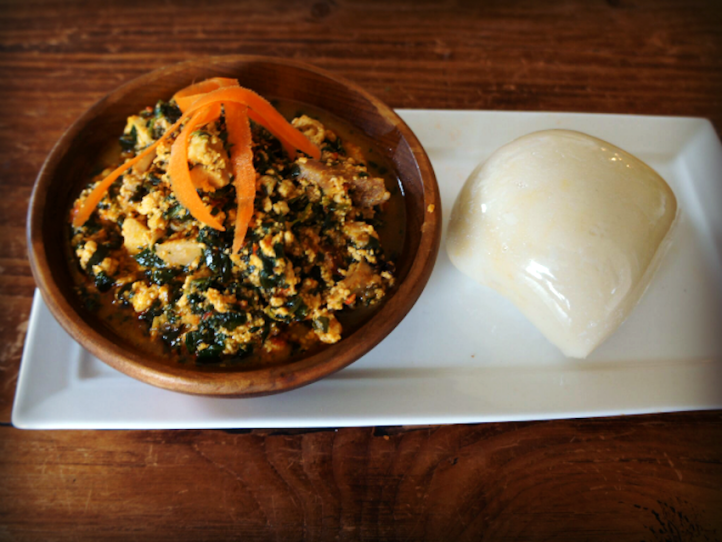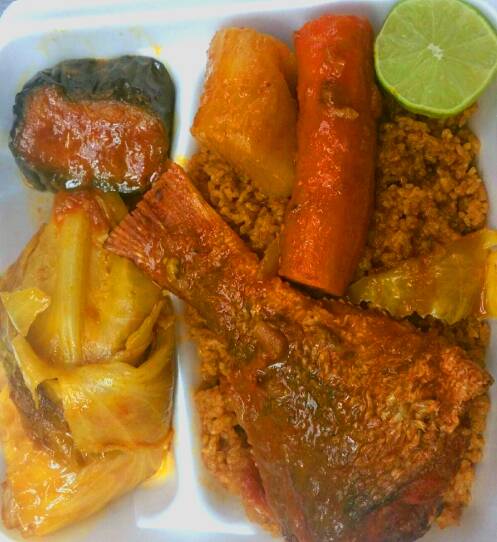In the Boston area, it’s not so unusual to eat African food, but it’s often at an Ethiopian restaurant, or maybe Moroccan. Africa is a vast continent. Its true size, according to an interesting comparison, shows that it’s about as big as China, India, the United States, and most of Europe put together. Yet our experience with African foods is often confined to very few countries. It doesn’t have to be this way. Massachusetts is home to many restaurants with roots in West Africa, and the cuisine is here for the eating.

Beyond black-eyed peas
I’m not usually a fan of black-eyed peas, but being African-American, I always feel like it’s a food requirement. Thankfully, there are many different preparations to try, and Nigerian style was one I hadn’t experienced yet. So I visited Suya Joint in Roxbury. Their version of the beans was stewed in a tomato sauce, not too spicy, and tender but not mushy. They were just right! But that's just the beginning.
Obehi Janice, named "Boston's Best Actress" by The Improper Bostonian in 2014, drew inspiration from food when creating her one-woman show FUFU & OREOS. (You can see her perform in a new play called We’re Gonna Die, starting on April 20th.) "Fufu is a staple dish in Nigeria and you eat it with soup," says Janice. "Oreo cookies are a staple snack in the United States. They are also a euphemism for Black people who 'act or sound white.'" The catchy phrase is meant to address her dual identity as both Nigerian and American.
"Even deeper than that," she says, "There is always one Ghanaian who will challenge me to say out loud that fufu is solely a Nigerian dish. And that addresses the fact that not all West Africans are the same." Then in fun, she says that Nigerian fufu is the true fufu! Suya Joint’s menu describes fufu as, “a dumpling made from pounded grain that’s made into a dough-like consistency.”
Another reason to dine West African
One thing you may notice on the menu at a Nigerian restaurant, along with fufu, is many foods that are gluten-free. Chichi “Pat” Ononibaku, owner of Baku’s African Restaurant in Amherst, Massachusetts, says, “Southeastern Nigerian traditional cuisine is gluten and lactose free. We do have what I call ‘colonial foods’ introduced to Nigerians by the British that contain gluten such as wheat bread and pastries.” Ononibaku includes cake as a colonial food made with dairy. Eating at a West African restaurant may be a way for many to stick to a gluten free and lactose free diet when dining out.

Greater Boston abounds with options
Safari African Restaurant is a fairly new restaurant in Mattapan. Owner Moe Sillah says he and his wife first talked about opening an African restaurant about five years ago. After visiting New York and Philadelphia, he felt there was a need in Boston. “We opened our doors only 7 months ago, and so far it's been wonderful. Our customers are basically people from all over the world.” Food on their menu comes from several countries in West Africa, including Nigeria, Senegal, Liberia, Guinea, and Sierra Leone.
If you are looking to expand your palate to the region of West Africa, the Greater Boston area has several places for you to try, including:
Suya Joint Restaurant - 185 Dudley St., Roxbury, 617-708-0245, suyajoint.com
Bakus African Restaurant - 197 North Pleasant St., Amherst, 413-253-7202 bakusafricanrestaurant.com
Safari African Restaurant - 1336 Blue Hill Ave., Mattapan, 617-296-0011,
facebook.com/safariafricanrestaurant
Taste of Karibu - 10 Crescent St., Waltham, 781-899-7444, tasteofkaribu.com
Teranga Senegalese Restaurant - 1746 Washington St., Boston, 617-266-0003, terangaboston.com
Lisa Johnson writes the lifestyle blog Anali’s Next Amendment. Follow her on Twitter @AnaliFirst.




